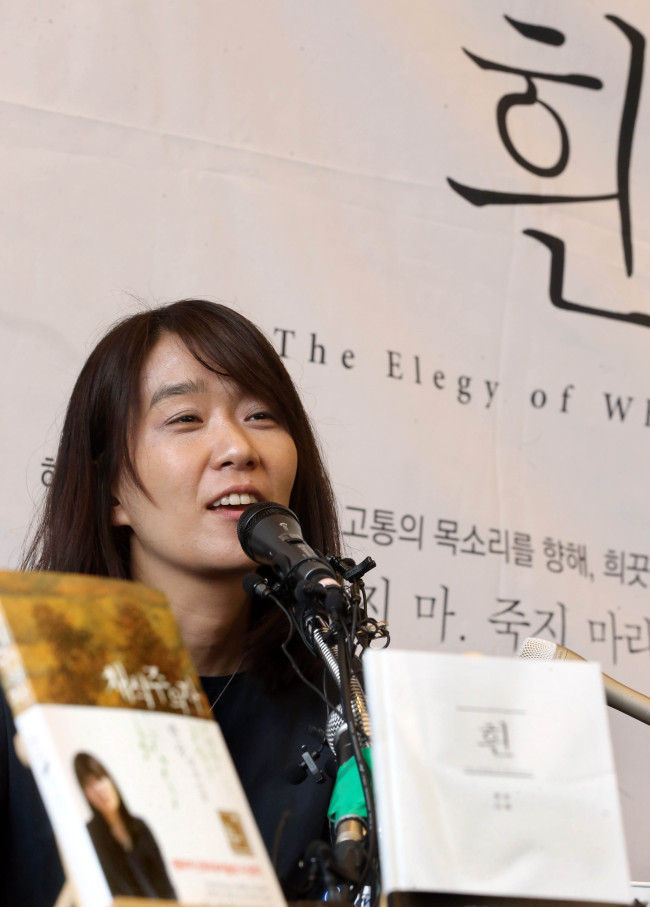Novelist Han Kang is receiving a level of media attention that few in the literary profession have experienced.
Fellow writers and critics welcome the international breakthrough for Korean literature that her Man Booker International Award win is anticipated to bring. Local papers are analyzing her award-winning novel, “The Vegetarian,” first published in 2007, sentence by sentence. There is even newfound interest in the field of literary translation.
Amid the frenzy, however, what Han wants to do most is “hide away” in her room and “start writing,” she told some 100 reporters at a press conference in Seoul on Tuesday.
The 45-year-old writer appeared unaccustomed to the spotlight as she entered a book cafe in the Hongdae district and smiled for a swarm of photographers.
“I want to hurry back and continue the new novel I’m working on,” said Han. “I think it is best to say what I want to say in the form of books for my readers, like I have done up to now.”
Han said her Booker win last week -- the first time a Korean writer nabbed the prestigious literary accolade -- was “unexpected.”
“I was so sleepy to the point I couldn’t open my eyes because of the time difference,” she said about the May 16 award ceremony in London. “It didn’t feel real. ... I think one of the reasons I was composed was because ... it has already been 11 years since I wrote this novel. The fact that I was being given this prize after traversing through such a long period of time and in such a faraway place felt strange, in a good way.”
Since her win, sales of “The Vegetarian” have skyrocketed here. At major local bookstore Kyobo Book Center, sales of the novel soared to 6,175 copies on the day after the announcement. Over 3,500 copies have been sold daily since then. Internet bookstore Yes 24 said it had sold over 20,000 copies in the two days following the announcement of Han’s win.
Abroad, “The Vegetarian” is currently licensed for publication in 27 countries according to KL Management, which handles Han’s overseas book deals. In the U.K., 20,000 more copies have gone to print to meet the increased demand.
 |
Writer Han Kang speaks to local reporters during a press conference held at Cafe Comma in Seoul on Tuesday. (Yonhap) |
“I wasn’t a best-selling writer,” said Han. “It’s unbelievable. To my knowledge, some 20,000 copies of ‘The Vegetarian’ sold in total over the 10 years before I was listed for this prize. ... I thought those who had read it were precious readers.”
“Someone asked me if there had ever been a happier day in my life,” she recalled about receiving the award. “But happiness is a subjective thing. Even when I write. ... I keep wavering between the fear of not being able to finish and the hope of finishing the novel. ... I don’t have the capacity to think about what comes afterwards.”
“Whiteness” -- A conversation between text and imageHan also introduced her new book, “The Elegy of Whiteness,” which was released locally the following day.
Comprised of 65 short pieces that draw from autobiographical elements and are written in a prose style somewhere between essay and poem, the novel talks of “all things white that cannot be sullied.”
“The Vegetarian” questioned the coexistence of beauty and violence while Han's 2014 novel “Human Acts” talked about overwhelming acts of social aggression. In “Whiteness,” Han said she wanted to address “something bright,” an unfailing “human dignity.”
The idea for the novel came about during her stay in Warsaw, Poland in the summer of 2014, she said. In a city that had been destroyed by bombings and then reconstructed, Han said she thought of her older sister whom she had never known, who died just two hours after birth.
“If I could give a part of life to that person, I thought it would be something that could not be sullied no matter how hard you try -- something transparent, life, light, the bright, the dazzling, something white. ... It’s a strange book, and it took that much longer to polish it.”
Between the pages of writings are photographic works by media artist Cha Mi-hye, a graduate of France’s National School of Fine Arts, that depict sparse frames of snowfields, water and sunlight. Han said she felt Cha’s pieces would pair well with her new novel, as both works deal with the “the point of encounter between life and death.”
“It’s a book that proceeds like a conversation between text and image,” said Han, who professed to be an art aficionado.
The two artists will be holding a joint exhibition from June 3-26 at Space O’New Wall in Seongbuk-dong, featuring Cha’s works and video installations by artist Choi Jin-hyuk that capture Han engaged in performance art.
“I learned a lot through this process. Until now, I didn’t think I would be able to say something through a medium other than language,” said Han.
By Rumy Doo (
doo@heraldcorp.com)




![[Today’s K-pop] Blackpink’s Jennie, Lisa invited to Coachella as solo acts](http://res.heraldm.com/phpwas/restmb_idxmake.php?idx=644&simg=/content/image/2024/11/21/20241121050099_0.jpg)



